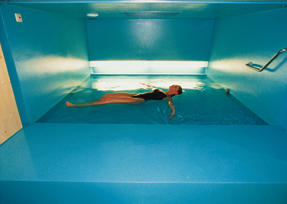Experience the Senses and Floating
Hugo Kükelhaus and his Experience field for the development of the senses
Hugo Kükelhaus - architect, pedagogue and philosopher - researched and applied theories about the development of the human senses. He concludes that:
... modern man in his technical civilization robs himself of the fundamental experiences necessary for the development of the body and the senses.
Kükelhaus designed, built and consulted according to more organic principles based on the human body. He develops grasping-touching toys Allbedeut for infants that shall help develop still untrained senses. Kükelhaus advocates an experience with the world through the senses instead of a just intellectual engagement with the world.
His Experience field for the development of the senses (review) (presented at Expo 1967 in Montreal) is a serious of experience stations that makes participants engage with the natural world to encourage learning through the body. It is about the discovery of fine nuances of perception, the experiencing of your own body and its senses. His stations explore e.g. the natural humming frequency of the human body, Chladny patterns, the scent of herbs, haptic barefoot experience of nature, balancing exercises, the all-present oscillations in the world through swing sets, the effects of rotating spirals onto visual perception, creation and observation of vortices in water. He says that by staring intently at a vortex structure flowing in water, the viewer subconsciously becomes part of the process and is not only a spectator anymore. Spiral motions are a very elementary motion that effects and resonates in the human.
We have to live in harmony with the oscillation between opposites.
"Left and Right are unexchangeable!"
"Evolution is not goal oriented. Evolution is always at the goal."
"Discovering is Remembering" [>Plato]
MUWA - Museum der Wahrnehmung
http://www.muwa.at/
The Museum of Perception in Graz, Austria collects installation and experiences created by artists, designer and psychologists. The installations include visual illusions, half-translucent mirrors, stereoscopy experiments, standing waves in a space filled with noise and a swap of vision with your touch sense.
The basement of the museum houses a Samadhi bath, that makes you experience weightlessness in a saltwater bath, deprived of all visual or auditory disturbance.
Heinz von Foerster says at the opening of the museum;
"Wir verstehen das Verstehen nicht. Es entzieht sich uns. Es entschlüpft uns, denn wir merken nicht das Unglaubliche, das Rätselhafte, das Erstaunliche, das Wunderbare, das in alltäglichem Gespräch und Reflexion vor sich geht. Erst wenn dieser Strom von Selbstverständlichkeit durchbrochen wird, stehen wir staunend vor diesem Wunder."
Heinz von Foerster quotes Wilhelm von Humboldt:
"Um zu reflektieren, muss der Geist in seiner fortschreitenden Tätigkeit einen Augenblick still stehen, das eben Vorgestellte in eine Einheit fassen, und auf diese Weise, als Gegenstand, sich selbst entgegenstellen. Die Einheiten, deren er auf diesem Wege mehrere bilden kann, vergleicht er wiederum untereinander und trennt und verbindet sie nach seinem Bedürfnis."
 Museum der Wahrnehmung / Museum of Perception in Graz, Austria
Museum der Wahrnehmung / Museum of Perception in Graz, Austria Heinz von Foerster experiments with the installation Fidschi at the opening of the museum in 1996.
Heinz von Foerster experiments with the installation Fidschi at the opening of the museum in 1996.Samadhi / Isolation / Flotation Tank
A sound- and light-proof tank filled with salt water at comfortable human body temperature was first used by Dr. John C. Lilly in 1954 to test the effects of sensory deprivation. Lilly - a neuropsychologist - wanted to answer the debate over whether the brain was only reacting to outside stimuli or also active in absence of such.
"Somewhere, deep within the brain, was a mechanism capable of generating internal experiences completely independent of the outside world, and this settled the issue of what happens in profound physical isolation. [...] The isolated mind becomes highly active and creative."
He himself had experiences of free-association (seemingly random) and of lucid dreaming (greater degree of control). Most people report enhanced mental powers.
The last twenty minutes often end with a transition from beta or alpha brainwaves to theta, which typically occurs briefly before sleep and again at waking. In a float tank, the theta state can last for several minutes without the subject losing consciousness. Many use the extended theta state as a tool for enhanced creativity and problem-solving or for superlearning. The more often the tank is used the longer the theta period becomes. - [wikipedia]




